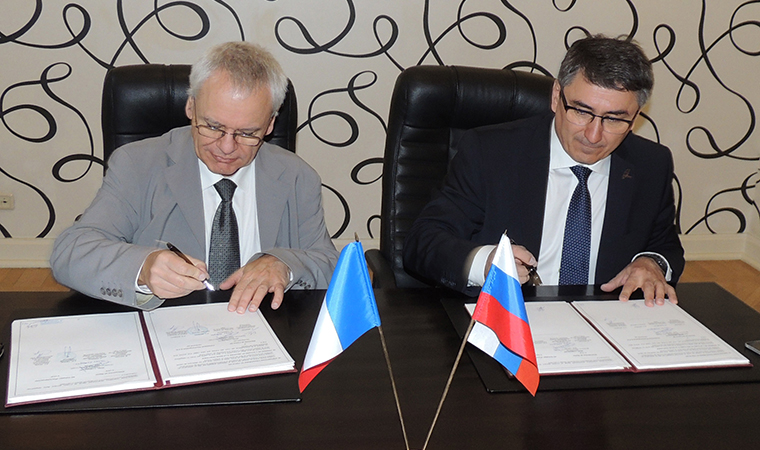
Rosatom in Africa, Asia and Europe
back to contentsRussia’s state-run nuclear corporation Rosatom is expanding its partnership with Algeria. Rosatom and Algeria’s Atomic Energy Commission signed a memorandum of understanding and cooperation on the peaceful uses of nuclear power. The document specifies a format for the partnership between Russia and Algeria in energy and non-energy areas. In the energy area, it provides for a joint nuclear station construction project in Algeria to be based on Russian technologies, cooperation on the nuclear fuel cycle, Algeria’s participation in experiments carried out at MBIR, a multipurpose fast neutron research reactor now constructed at the Research Institute of Atomic Reactors (RIAR), nuclear safety cooperation, employee development and training, including training of Algerian students and industry employees at Russian universities.
In non-energy areas, the parties will continue discussing and estimating opportunities for the construction of a nuclear science and technology center with a Russian-designed research reactor, a facility to produce isotopes for the Algerian industry, nuclear medicine centers, and irradiation centers to boost production efficiency in agriculture. The parties will draft a joint road map for the development of Algeria’s civil nuclear program to identify projects of mutual interest and implement them by joint working groups.
Rosenergoatom and EDF signed an agreement
Rosenergoatom (a Russian NPP operator) and Electricite de France signed an agreement at the WANO Governing Board’s meeting held in St. Petersburg. The parties intend to grow partnership in such areas as operation, modernization and life extension of nuclear power stations, decommissioning and nuclear waste disposal, and NPP-related research and development programs.
Rosenergoatom’s First Deputy CEO Alexander Shutikov noted, “The new agreement continues more than 20 years of win-win cooperation between two major nuclear operators that understand the greatest potential in using the accumulated experience in joint projects.”
Dominique Minière, EDF Executive Director for NPP and TPP operation, remarked, “Started in 1994, our cooperation with Rosenergoatom has flourished most amazingly. We have proceeded from certain nuclear safety issues to operation, maintenance and repair, new construction and Generation 4 reactors (both Russia and France have significant achievements in this area).”
Nuclear technologies presented in Kazakhstan
Kazakhstan is Rosatom’s strategic partner. It is already the sixth time the nuclear corporation has taken part in the International Nuclear Power Engineering and Industry Exhibition in Kazakhstan (Kazatomexpo-2016). The collective exhibition stand featured technologies and solutions developed by diverse Russian nuclear companies, among them Rusatom International Network, ASE Engineering Group, RosRAO (a backend service provider), N. Dukhov Russian Federal Research Institute of Automatics (a Nuclear Weapons Division company), International Uranium Enrichment Center and Elemash (a subsidiary of TVEL Fuel Company).
“The Kazakhstan market holds much promise for Russian companies”, said Sergei Gromov, Head of Rosatom Central Asia. “Currently, the nuclear cooperation between Russia and Kazakhstan stretches across several areas: uranium extraction and enrichment, fuel supplies for the research reactor, disposal of spent reactor fuel and radioactive waste, and decommissioning of hazardous nuclear facilities located in Kazakhstan. All these areas have a good outlook for development.”
Gaining support in Bangladesh
Another noteworthy nuclear industry event in Asia was the round table discussion on environmental and social aspects of atomic energy. The event was organized by ASE Group in Dhaka, Bangladesh. Among its participants were representatives of the country’s Ministry of Science and Technology, Atomic Energy Commission, Rooppur NPP, University of Dhaka, and other major organizations involved in the construction of Rooppur NPP, the first nuclear power plant in Bangladesh. The Russian party was represented by Ilya Platonov, Editor-in Chief of Nuclear.Ru news agency, Sergei Zhuravlev, a representative of ASE Communication Department, Arkady Karneev, Communications Manager at Rosatom Asia, and others.
Ali Zulquarnain, Chairman of Bangladesh Atomic Energy Commission, noted in his welcoming speech the importance of the topic being discussed. “In order to build the first NPP in Bangladesh successfully, it is important to raise public acceptance of nuclear power and educate the society on safety and advantages of nuclear power. In January 2015, Bangladesh and Russia signed the Nuclear Power Communications Strategy 2015–2021. The purpose of this strategy is to provide the society with more comprehensive understanding and knowledge about the character, necessity and benefits of nuclear power in energy security, social and economic development as well as safety and security requirements, which is, according to the IAEA rules, a cornerstone of the nuclear infrastructure in any country making its first step in the national nuclear power program development,” he said.
The round table participants discussed advantages of nuclear power and non-energy use of nuclear technologies, as well as opportunities opening up before Bangladesh as it enters the “nuclear club”.
ASE Group, together with Rusatom International Network, exhibited works of the Hungarian photographer Vince Balint, who dedicated them to the abundance and diversity of the scenery around nuclear power plants. In 2014, he visited all the ten nuclear power plants operating in Russia and captured Russian nature in all its magnificence and richness. Inspired by the beauty of nature, the photographer decided to create a project expressing the variety and uniqueness of the scenery around nuclear stations. All pictures were taken in close vicinity to Russian nuclear power plants and clearly testify to the peaceful co-existence of nature and nuclear power.
Trilemma of the European power industry
Europe was also in Rosatom’s line of vision as the company’s representatives took part in the yearly European Power Summit held in Amsterdam this year. The topic discussed at the summit organized by Platts, an energy news agency, was the power industry strategy in transition to more eco-friendly business models.
Speaking at the panel discussion, Andrei Rozhdestvin, Head of Rosatom Western Europe, emphasized the key role of atomic power in handling the most burning issues faced by the European Union. “Much is being talked about a ‘trilemma’ of the European energy industry, that is decarbonization, security of supplies and affordability. I think that nuclear power fits in perfectly as a response to all of these challenges. I am sure there is room for nuclear power in the EU energy sector. I believe that every country should be allowed to make its own choice whether it wants to continue its nuclear program and operate its nuclear power plants.”
Andrei Rozhdestvin reminded the participants of Rosatom’s expertise in constructing nuclear stations compliant with the latest safety requirements and technical standards. Dmitry Sukhanov, Deputy CEO of Atomenergosbyt, also delivered a speech at the summit. His report was focused on the integration of Baltic markets through the utilization of third-party infrastructure as exemplified by the Baltic NPP project in Kaliningrad.




